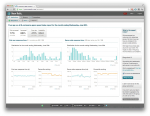
This probably won’t come as a surprise, but people are impatient. Naturally, this means that your customers are impatient. So, for websites and applications, speed and performance are critical. For example: An Aberdeen Research Group study found that, on average, one second of lag-time can translate into a 7 percent decrease in conversions and $2.5 million in lost revenue each year.
New Relic, one of a number of startups that has emerged in the last 5 years to address the costly, patchwork BS of old-school enterprise monitoring solutions, gives developers an easy, cloud-based way to keep tabs on their apps in realtime — without breaking the bank.
Of course, while any old monitoring and analytics service might bring that measurable 5 to 10 percent performance boost, what does it matter if your apps are still tortoises compared to your competitors? Today, New Relic is launching a tool that aims to give businesses some of that comparative insight, report card-style. The App Speed Index shows New Relic users how their performance compares to that of 25,000 other companies — in 14 industry-specific categories — to help them avoid losing millions to the speedier competition.
While there are plenty of performance monitoring, segmentation, and speed optimization tools out there, New Relic thinks that it has a (Big Data) size advantage. The key to the Speed Index comes from the fact that it collects over 55 billion performance metrics and monitors 1.5 billion page loads for its 25,000+ customers and their 500,000 app instances. Essentially, this means New Relic is collecting, storing, and analyzing 3.5 terabytes of data every day.
In truth, most companies are monitoring and optimizing speed in a relative vacuum, but using that 3.5 terabytes of daily data, the Index gives managers and developers specific insight into user experience, measuring performance improvements over time — in the context of their own industry.
As New Relic explained in a blog post this morning, the tool enables its customers to compare their apps to Peer Groups of similar apps, whether they be eCommerce, SaaS, gaming, or consumer web. After classifying their app, users can view their percentile rank within their peer group “for end user and application response times, error rates, and application availability.” All touch points that presumably matter to your business.
In this way, users will see how much faster you have to be to measure up to the rest of the pack. And, in the spirit of incentivization through public benchmarking, the startup has launched a “living infographic,” which ranks peer groups by performance and availability.
The page lists the fastest apps monitored by New Relic and displays them in a public leaderboard, updated daily. Whether you call it gamification or humiliation, the Index allows users to see just who the Joneses are and what they have to do to keep up with ‘em. The idea being that they’ll be eager to become conspicuous consumers.
Companies can opt-in to participating in the index, or not. So, to incentivize companies who might be thinking, “wait, if I can see their data, they can see mine…” New Relic gives them the option of whether or not to share, and in the event they do, their data is kept anonymous. So, when a user opts-in, they make end-user response time, server-side response time, error rate, downtime, etc. available to be compared, and as their blog post says, “others in your Peer Group have done the same, but you’ll never know exactly who they are.”
The resulting rankings allow admins and managers more granular comparisons between the front-end and back-end performance of their apps and New Relic’s 20K+ users. Those participating receive access to a dashboard that compares these different touch points (speed, responsiveness, etc.) with that of others in their industry group, along with an over-arching percentile ranking.
At launch, the Index shows that, out of the 820+ apps that have opted-in to the App Speed Index, Mirror Slots takes first place, with Argos in second and Intuit’s Live Community in third. As for eCommerce, InSales ranks as the speediest, followed by Shopify and Fotolia.
Accompanying the launch of its Speed Index, New Relic is also launching custom dashboards for personalized business metrics and correlative info so that users can see how shopping cart abandonment relates to changes in app performance, for example. The custom dashboards are drag and drop, too, which means there’s no coding required.
This last part is only available to users with Pro accounts, however, which runs at about $150/month. More on pricing here. While its new features help it stand out and may prove appealing to new users, New Relic does face (at least nominal) competition of its own from startups like Mixpanel, AppDynamics, and Crittercism — to name a few. Though, with four years experience and $34.5 million in funding under its belt, New Relic’s APM solution has plenty of traction — and fuel left to burn.
For more on Index and Custom Dashboards, see New Relic’s blog post.





